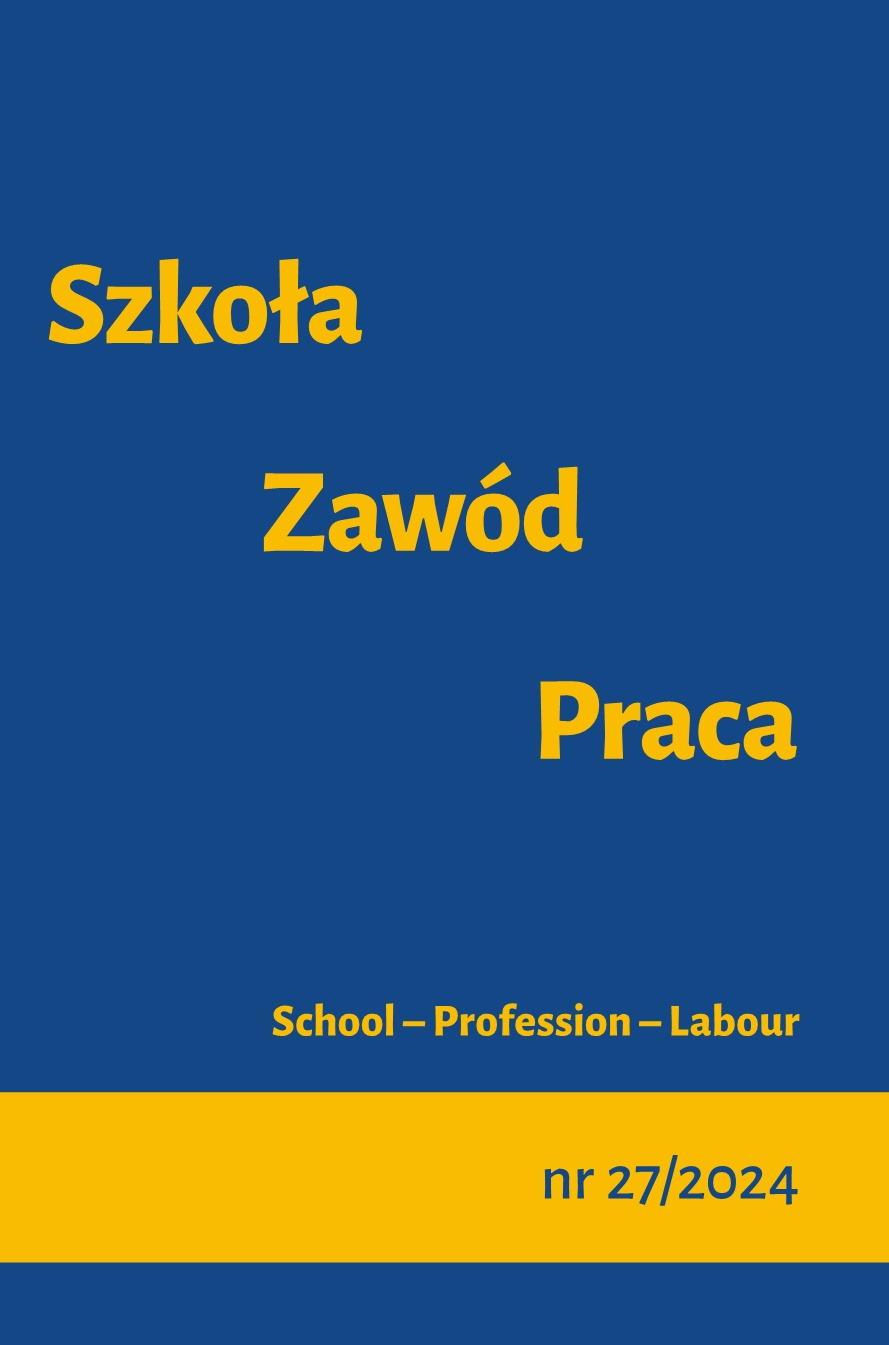Resilience and teacher agency in the context of self-determination theory
DOI:
https://doi.org/10.34767/SZP.2024.01.04Keywords:
resilience, teacher agency, teacher self-efficacyAbstract
The purpose of the article is to find the relationship between resilience and teachers’ sense of agency and sense of self-efficacy. The article presents the most important attempts to define resilience and resilience of teachers and is a theoretical attempt to identify and operationalize the common dimensions between resilience, agency, and self-efficacy of teachers. In certain areas, these three categories influence each other and are also related to motivation, success, work engagement, and teacher well-being. The article certainly does not explore the topic in depth, but rather signals the research possibilities arising from the specificity and multidimensionality of the categories discussed in the context of the teacher.
References
Ainsworth, S., Oldfield, J. Quantifying teacher resilience: context matters. Teaching and Teacher Education, 82 (2019).
Arnup, J., Bowles, T. Should I stay or should I go? Resilience as a protective factor for teachers’ intention to leave the teaching profession. Australian Journal of Education, 60(30) (2016).
Bandura, A. Social cognitive psychology: an agentic perspective. Annual Review of Psychology, 52 (2001).
Beltman, S. (2015). Teacher professional resilience: thriving not just surviving. In: N.L. Weatherby--Fell (ed.), Learning to teach in the secondary school. Melbourne: Cambridge University Press.
Beltman, S. (2020). Understanding and examining teacher resilience from multiple perspectives. In: C.F. Mansfield (ed.), Cultivating teacher resilience. International approaches, applications and impact te acher resilience. Singapore: Springer.
Beltman, S., Mansfield, C.F., Price, A. Thriving not just surviving. A review of research on teacher resilience. Educational Research Review, 6(3) (2011).
Biesta, G., Priestley, M., Robinson, S. The role of beliefs in teacher agency. Teachers and Teaching, 21(6) (2015).
Boczkowska, M.A. Pojęcie resilience w ujęciu tradycyjnym i współczesnym. Lubelski Rocznik Pedagogiczny, 38(4) (2019).
Boon, H.J. (2020). Teachers’ resilience: conceived, perceived or lived-in. In: C.F. Mansfield (ed.), Cultivating teacher resilience. International approaches, applications and impact teacher resilience. Singapore: Springer.
Borucka, A., Ostaszewski, K. Koncepcja resilience. Kluczowe pojęcia i wybrane zagadnienia. Medycyna Wieku Rozwojowego, 12(2, cz. 1) (2008).
Brouskeli, V., Kaltsi, V., Loumakou, M. Resilience and occupational well-being of secondary education teachers in Greece. Issues in Educational Research, 28(1) (2018).
Cong-Lem, N. Teacher agency: a systematic review of the international literature. Issues in Educational Research, 31(3) (2021).
Day, Ch., Hong, J. Influences on the capacities for emotional resilience of teachers in schools serving disadvantaged urban communities: challenges of living on the edge. Teaching and Teacher Education, 59 (2016).
Day, Ch., Sammons, P., Gu, Q., Kington, A., Stobart, G. (2009). Committed for life? Variations in teachers’ work, lives and effectiveness. In: M. Bayer, U. Brinkkjær, H. Plauborg, S. Rolls (eds.), Teachers’ career trajectories and work lives. Dordrecht: Springer.
Gordon, D., Blundell, Ch., Mills, R., Bourke, T. Teacher self-efficacy and reform: a systematic literature review. The Australian Educational Researcher, 50 (2023).
Gu, Q., Day, Ch. Teacher’s resilience: a necessary condition for effectiveness. Teaching and Teacher Educations, 23 (2007).
Gu, Q., The role of relational resilience in teachers’ career-long commitment and effectiveness. Teachers and Teaching: Theory and Practice, 20(5) (2014).
Imants, J., Van der Wal, M.M. A model of teacher agency in professional development and school reform. Journal of Curriculum Studies, 52(1) (2019).
Junik, W. (2011). Zjawisko rezyliencji – wybrane problemy metodologiczne. W: W. Junik (red.), Resilience. Teoria – badania – praktyka. Warszawa: Parpamedia.
Keogh, J., Garvis, S., Pendergast, D., Diamond, P. Self-determination. Using agency, efficacy and resilience (AER) to counter novice teachers’ experiences of intensification. Australian Journal of Teacher Education, 37(8) (2012).
Kitching, K., Morgan, M., O’Leary, M. It’s the little things: exploring the importance of commonplace events for early‐career teachers’ motivation. Teachers and Teaching, 15(1) (2009).
Konaszewski, K. (2020). Pedagogika wrażliwa na resilience. Studium teoretyczno-empiryczne. Kraków: Impuls.
Konaszewski, K., Kolemba, M., Niesiobędzka, M. Resilience, sense of coherence and self--efficacy as predictors of stress coping style among university students. Current Psychology, 40 (2019).
Li, S. The effect of teacher self-efficacy, teacher resilience, and emotion regulation on teacher burnout: a mediation model. Frontiers in Psychology, 14 (2023).
Mansfield, C.F., Beltman, S., Broadley, T., Weatherby-Fell, N. Building resilience in teacher education: an evidenced informed framework. Teaching and Teacher Education, 54 (2016).
Mansfield, C.F., Beltman, S., Price, A., McConney, A. Don’t sweat the small stuff: understanding teacher resilience at the chalkface. Teaching and Teacher Education, 28(3) (2012).
Morgan, M., Ludlow, L., Kitching, K., O’Leary, M. What makes teachers tick? Sustaining events in new teachers’ lives. British Educational Research Journal, 36(2) (2010).
Ryś, M., Trzęsowska-Greszta, E. Kształtowanie się i rozwój odporności psychicznej. Kwartalnik Naukowy, 34(2) (2018).
Schwarzer, R., Warner, L.M. (2013). Perceived self-efficacy and its relationship to resilience. In: S. Prince-Embury, D.H. Saklofske (eds.), Resilience in children, adolescents, and adults. Translating research into practice. New York: Springer.
Skuza, A., Pierścińska-Maruszewska, A. Klimat społeczny szkoły jako jeden z czynników chroniących – wzmacniających oddziaływania profilaktyczne (w kontekście koncepcji resilience). Resocjalizacja Polska, 6 (2014).
Täschner, J., Dicke, T., Reinhold, S., Holzberger, D. (2024).‘Yes, I Can!’ A systematic review and meta-analysis of intervention studies promoting teacher self-efficacy. Review of Educational Research, https://doi.org/10.3102/00346543231221499
Tenorio-Vilchez, C., Sucari, W. Understand teacher resilience. A systematic look. Revista Innova Educación, 3(3) (2021).
Tschannen-Moran, M., Woolfolk Hoy, A. The differential antecedents of self-efficacy beliefs of novice and experienced teachers. Teaching and Teacher Education, 23(6) (2007).
Ungar, M, Ghazinour, M., Richter, J. Annual research review. What is resilience within the social ecology of human development? Journal of Child Psychology and Psychiatry, 54(4) (2013).
Wheatley, K.F. The case for reconceptualizing teacher efficacy research. Teaching and Teacher Education, 21(7) (2005).
Wójtowicz, E. Motywowanie do szczęścia poprzez wspieranie autonomii dziecka – perspektywa teorii autodeterminacji. Fides et Ratio, 3(19) (2014).
Zhang, S., Luo, Y. Review on the conceptual framework of teacher resilience. Frontiers in Psychology, 14 (2023).
Żółtak, M. (2021). Teoria autodeterminacji (SDT) w procesie uczenia się w pracy. W: M. Żółtak, LEarNS. Stwórz efektywny system uczenia się w miejscu pracy. Warszawa: MT Biznes


